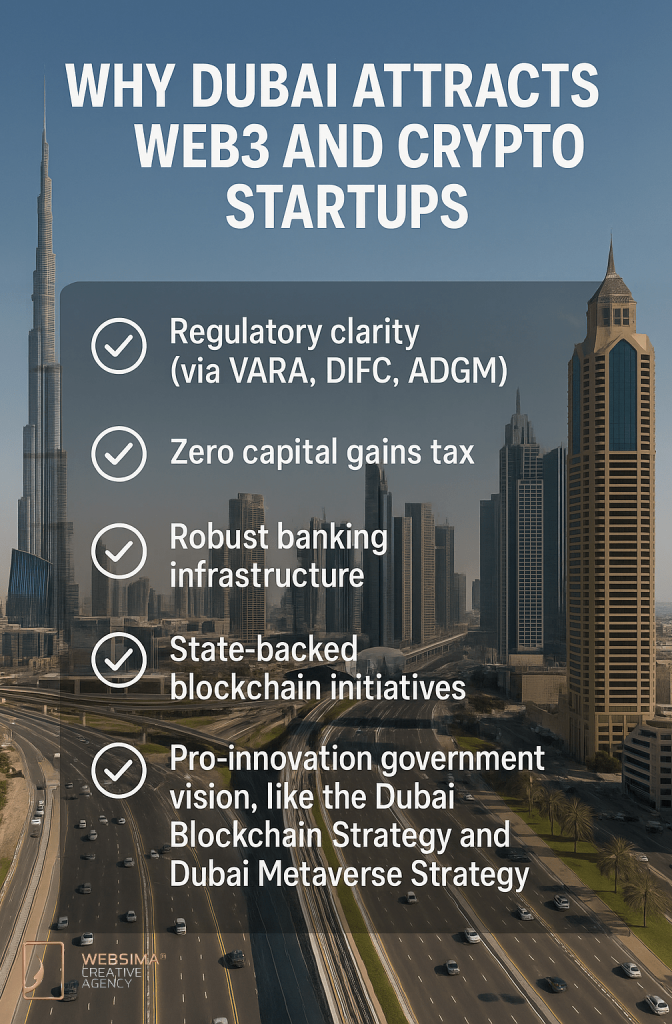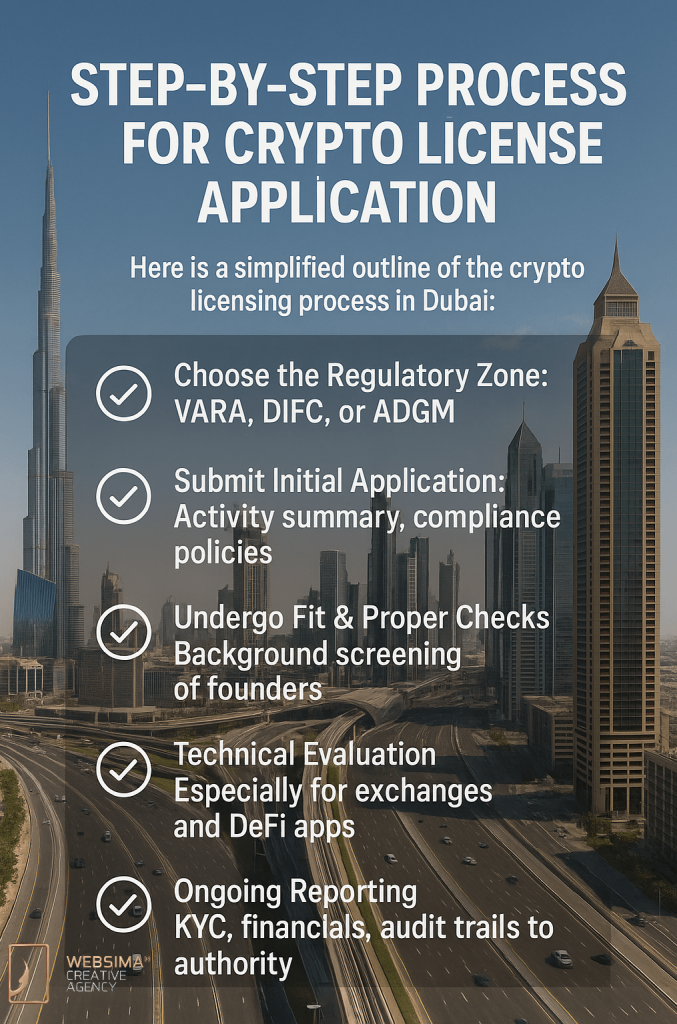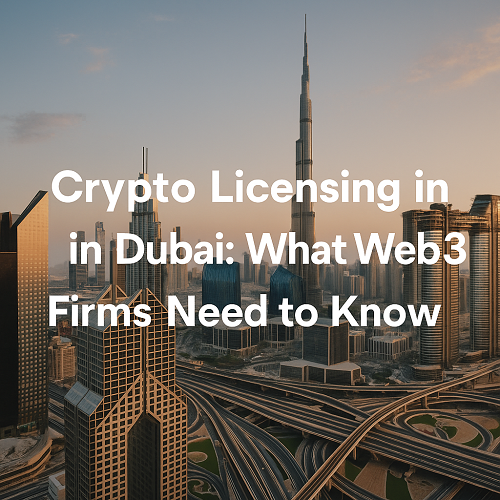Table of Contents
- Overview of Dubai’s Crypto Licensing Landscape
- Why Dubai Attracts Web3 and Crypto Startups
- Key Regulatory Authorities: VARA, DIFC, and ADGM
- Types of Crypto Licenses Available in Dubai
- Requirements for Obtaining a Crypto License in Dubai
- Step-by-Step Process for Crypto License Application
- Costs and Fees Involved in Crypto Licensing
- Compliance Obligations After Licensing
- Common Pitfalls and How to Avoid Them
- Future Outlook for Crypto Firms in Dubai
- FAQ: Crypto Licensing in Dubai
- Let Websima Help You Enter Dubai’s Web3 Ecosystem
Overview of Dubai’s Crypto Licensing Landscape
As one of the most forward-thinking jurisdictions in the world, Dubai has emerged as a global leader in Web3 and blockchain regulation. With the establishment of the Virtual Assets Regulatory Authority (VARA) in 2022, the Emirate became the first jurisdiction with a specialized regulatory body for virtual assets.
Whether you’re launching a DeFi app, NFT marketplace, or centralized exchange, securing a crypto license in Dubai is essential to operate legally and build investor trust. Besides, make sure to understand the Web3 and Blockchain challenges in UAE and how to overcome them to protect your time and money.
JUST IN: UAE issues its first-ever Bitcoin & crypto license!
Emirates Coin Investment (EmCoin) just became the first to get a virtual asset license from the UAE’s top regulator, SCA.
Regulated crypto is now live in the Emirates. pic.twitter.com/6b4NYlPjXI
— Coin Bureau (@coinbureau) June 3, 2025
Why Dubai Attracts Web3 and Crypto Startups
Dubai has become a top destination for crypto entrepreneurs due to its:

- Regulatory clarity (via VARA, DIFC, ADGM)
- Zero capital gains tax
- Robust banking infrastructure
- State-backed blockchain initiatives
- Pro-innovation government vision, like the Dubai Blockchain Strategy and Dubai Metaverse Strategy
According to a 2023 Binance report, the UAE became the country with largest crypto ownership in 2023.
Source –Binance Global Crypto Adoption Report 2023
Key Regulatory Authorities: VARA, DIFC, and ADGM
Dubai’s crypto license ecosystem includes multiple authorities, depending on the business model and location:
VARA – Virtual Assets Regulatory Authority
- Oversees crypto activities in mainland Dubai and special zones like DWTC.
- Regulates trading, custody, lending, NFTs, and VA management.
DIFC – Dubai International Financial Centre
- Offers licenses under Dubai Financial Services Authority (DFSA).
- Tailored for financial institutions and fintech firms.
ADGM – Abu Dhabi Global Market
- Regulated by the Financial Services Regulatory Authority (FSRA).
- Known for its comprehensive virtual asset framework, suitable for exchanges and custodians.
Types of Crypto Licenses Available in Dubai
The type of crypto license in Dubai depends on your business activity:
| License Type | Description |
| Proprietary Trading in Crypto Commodities | For trading virtual assets with company funds. |
| Crypto Exchange License | For centralized or decentralized trading platforms. |
| Custody Services | For businesses safeguarding user assets. |
| Broker-Dealer License | For firms matching crypto buyers and sellers. |
| NFT Marketplace License | For platforms offering NFT issuance and resale. |
| Web3 DApp Licensing | Newer model via VARA sandbox programs. |
Requirements for Obtaining a Crypto License in Dubai
To apply for a crypto license in Dubai, you typically need:
- Business plan outlining crypto-related activity
- KYC/AML compliance procedures
- Corporate structure documentation
- Proof of clean criminal record (UAE & home country)
- Financial projections and capital requirements
- UAE-based office address or authorized agent
- Technical infrastructure and cybersecurity details
Some regulators may also request smart contract audits and risk frameworks.
Step-by-Step Process for Crypto License Application

Here is a simplified outline of the crypto licensing process in Dubai:
- Choose the Regulatory Zone: VARA, DIFC, or ADGM
- Submit Initial Application: Activity summary, compliance policies
- Undergo Fit & Proper Checks: Background screening of founders
- Technical Evaluation: Especially for exchanges and DeFi apps
- License Issuance & Setup: Office, bank account, staffing
- Ongoing Reporting: KYC, financials, audit trails to authority
Note: The whole process may take 3 to 6 months depending on the authority and complexity of operations.
Costs and Fees Involved in Crypto Licensing
While the costs can vary, here’s a general estimate for 2025:
| Expense Type | Estimated Cost (AED) |
| Application & Registration Fees | 40,000 – 60,000 |
| Office Space (mandatory) | 20,000 – 100,000/year |
| Compliance Consultancy | 10,000 – 50,000 |
| Licensing from VARA or DIFC | 50,000 – 200,000+ |
| Bank Account Opening | 5,000 – 15,000 |
| Smart Contract Audits (if applicable) | 10,000 – 100,000 |
Compliance Obligations After Licensing
Once licensed, companies must maintain strict compliance standards, including:
- KYC/AML reporting to the regulator
- Real-time audit trails for transactions
- Annual license renewals and fee payment
- Incident reporting for cyber or data breaches
- Continuous improvement of risk management frameworks
Failure to comply may result in license suspension or revocation.
Common Pitfalls and How to Avoid Them
Here are frequent mistakes crypto startups make during licensing:
| Mistake | Recommendation |
| Submitting incomplete applications | Hire a local legal advisor |
| Choosing the wrong regulatory zone | Compare VARA vs. DIFC vs. ADGM thoroughly |
| Ignoring compliance tech stack | Invest in RegTech solutions early |
| Underestimating operational costs | Plan for 12 months of runway |
| Launching before licensing | Wait until you are fully approved |
Future Outlook for Crypto Firms in Dubai
The future of Blockchain and Web3 in the UAE looks bright and exciting, particularly in Dubai .The city is expected to continue leading globally in blockchain regulation, with upcoming developments like:
- Dubai Digital Economy Strategy 2030
- Expansion of virtual asset zones in free zones like DMCC
- Stricter DeFi and stablecoin frameworks by late 2025
- Interoperability with international jurisdictions for crypto passports
According to Cryptooasis, Web3 investment in MENA reached $282 Million in May 2024, much of it centered in the UAE.
FAQ: Crypto Licensing in Dubai
Q: Can foreigners apply for a crypto license in Dubai?
Yes. Foreigners can register a company and apply for a crypto license with a UAE-based legal presence.
Q: Is crypto trading legal in Dubai?
Yes, crypto trading is legal under licensed platforms regulated by VARA, DIFC, or ADGM.
Q: Do I need to be physically present in Dubai to get licensed?
Not necessarily, but having a local agent or office is typically required.
Q: Are DeFi and NFTs regulated under crypto laws?
Yes. VARA’s 2023 guidelines cover DeFi, NFT marketplaces, and tokenized assets.
Let Websima Help You Enter Dubai’s Web3 Ecosystem
Navigating the crypto license Dubai requirements can be complex, especially for Web3 firms handling NFTs, DeFi, or tokenized assets. At Websima, we specialize in helping blockchain companies:
- Choose the right regulatory framework (VARA vs. DIFC vs. ADGM)
- Prepare and submit licensing documents
- Implement KYC/AML and compliance tech
- Build blockchain-ready websites and dApps
- Set up legally compliant smart contracts and DAOs
Let our team help you launch confidently in the UAE.
Contact Websima to Start Your Crypto Licensing Journey





